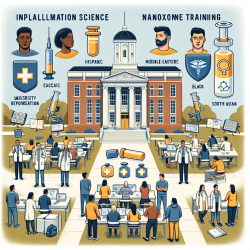Introduction
In the realm of disaster risk reduction (DRR), the integration of mental health research is a burgeoning field that holds immense potential for improving outcomes, particularly for vulnerable populations such as children. As professionals in the field of speech-language pathology, we are uniquely positioned to contribute to this critical area by leveraging our expertise in communication and child development.
The Importance of Mental Health in Disaster Contexts
Disasters, whether natural or man-made, disrupt communities and have profound impacts on mental health. Research indicates that children, among other vulnerable groups, are at increased risk for adverse mental health outcomes following such events. These outcomes can include anxiety, depression, and post-traumatic stress disorder, which can impede a child's development and communication skills.
Bridging the Gap: The CONVERGE Disaster Mental Health Training Module
The Incorporating Mental Health Research into Disaster Risk Reduction: An Online Training Module for the Hazards and Disaster Workforce provides a comprehensive overview of mental health outcomes associated with disasters. This module is a valuable resource for practitioners seeking to enhance their skills in integrating mental health considerations into DRR practices.
Key features of the module include:
- An overview of mental health outcomes and risk factors associated with disasters.
- Evidence-based programs and tools to guide practice.
- Recommendations for future research to advance the field.
Implementing Research Outcomes in Practice
For practitioners in speech-language pathology, incorporating the insights from this module into practice can enhance the support provided to children affected by disasters. By understanding the psychosocial dynamics at play, practitioners can tailor interventions to address specific mental health needs, thereby improving communication outcomes for children.
Furthermore, the module's focus on methodological approaches equips practitioners with the skills necessary to conduct rigorous research, contributing to the evidence base that informs effective DRR strategies.
Encouraging Further Research
While the module offers a robust foundation, it also highlights the need for ongoing research. Practitioners are encouraged to explore areas such as:
- The long-term mental health impacts of disasters on children.
- Innovative interventions that integrate mental health and communication support.
- Collaborative research efforts that bridge disciplines and enhance DRR practices.
Conclusion
By engaging with the CONVERGE Disaster Mental Health Training Module, practitioners can enhance their capacity to support children in disaster contexts. This not only improves individual outcomes but also contributes to the resilience of communities as a whole. As we continue to build bridges between mental health research and DRR, the potential for positive impact grows exponentially.
To read the original research paper, please follow this link: Incorporating Mental Health Research into Disaster Risk Reduction: An Online Training Module for the Hazards and Disaster Workforce.










